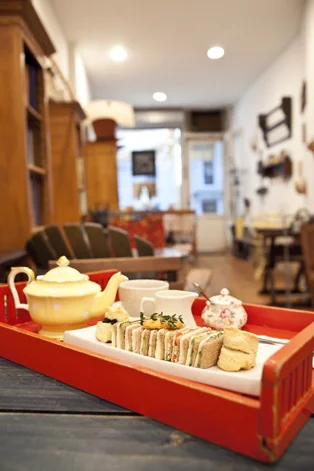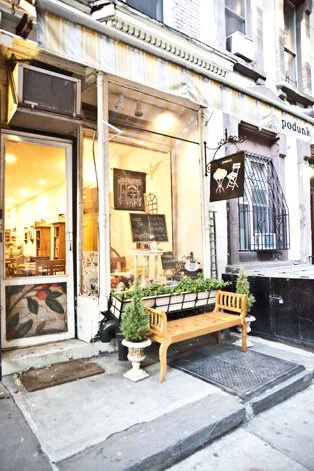The early days at Podunk
On August 31, 2002, we opened at 5:00 in the afternoon. It was Labor Day weekend and I had promised my husband we would open in August. I had a bad case of stage fright when it came to turning around the "Open" sign. That has never really changed, but on this day, he was becoming adamant. True, August was waning. But a water main was broken on the street, and we had no water. Not hot, not cold. A tea room could not open up without water. Despite customers waiting outside, I was a little insistent myself. Somehow, that first day passed, and the rest of our days have sort of been like rolling down a hill. Not every person and every incident makes it into my long-term memory banks. But I'll always remember the first customer I knew by name. This is also the story of our front door, the subject of many comments and much scrutiny.
“This place is beautiful,” said a young man with an Adonis-like explosion of golden curls. “It is really quite wonderful.”
“Thank you, thank you,” I said. “Are you here for tea?” He smiled, and nodded, but was unwilling, in the most polite way possible, to leave the conversation in the territory of a mere order.
“Your distressed door is charming,” he added, motioning to the front of the room. “And fashionable. Very fashionable.”
He had an white cashmere sweater tied casually around his shoulders, and the collar of his pima cotton polo shirt, in the creamy color of orange sherbet, stood straight up. Along with the neatly crumpled linen trousers he wore, his clothing gave off the impression that he knew fashion. And that he was set on lingering for a little chat.
The point was that we hadn't meant to have a distressed door. Quite the opposite, was true; we'd hoped for a crisp, clean cottage look when the painters had set about to cover up the azure wood of the storefront with our nice bright whitewash. They hadn't been particularly thorough, however, in painting over the filled holes and screw marks of previous hardware, such as locks and door handles. Blue nicks peeked through in some areas and shimmered wanly behind whitewash that had been applied too thinly.
Our own locksmith, in attempting to line up door and frame, had suggested, alternatively, that we either have a new door and frame made—luckily, he had a friend in the carpentry business—or demolish the entire gingerbread storefront and bay window in favor of a glass and aluminum rigging, summoning for me the vision of a dry cleaning store. And luckily—and we were so fortunate in our choice of locksmiths—he knew someone who could do this work at a reasonable price. In all fairness, our additions of door handles, new locks, and simple sanding attempts to fit the rectangular door into the parallelogram of the frame had resulted in so many scars that in some places, the evergreen that had preceded the blue showed through.
Further, the locksmith had made all his suggestions as he removed a hinge from the door and watched rotten wood stream like the sands of time all over my just-varnished, barely cured floor. His timing was that perfect.
Now, after only a week of being open, I had learned that shorter answers were easier, that if every detail of our lives could be turned into a story, so it could also be turned into a brief yes or no intended to move the line along. But the eyes of Adonis were watching me closely, and there was something else on his mind. I decided to answer.
“I don't think there was an intention on our part to be, as you say, fashionable,” I told him. “There were some difficulties and, well, we just sort of resigned ourselves to the door's own character.”
“Ah,” he said. “In Italian, we have a word for this. It means the equivalent of your 'as is' but we mean it more appreciatively.”
“Like the well-worn stones in a very old church?” I asked. He nodded. “Like the chipped and rubbed finish of a beloved dining table?”
“Yes, you have it,” he said. “It's delightful. Now, please blend some black tea and mint, no milk or sugar.” I put his tray together, and he paid, and then took a very deep breath.
“My name is Sergio,” he said. “I live on this street. I have been watching your family struggling with that door these last two weeks, and I was very much on your side in the battle. But now that I have seen that door up close, it seems as if something of a very fine truce was achieved.” He added a scone to his tray, and turned to take a table.
I started laughing. I couldn't wait to tell my husband and daughter about this funny fellow. While we had worked on the exterior of the shop, I'd forced myself to believe we were invisible. I didn't want to think of people watching us. We'd been hot in the July and August sun, and splattered with paint, and who knows how inept or efficient we appeared while installing the windowbox, or the ornate iron grates that lined the wall under the bay window. I'd told myself we were workers, anonymous and of no interest. Now it was clear we'd been busted.
But his were benevolent eyes, to be sure. He'd been rooting for us to open even before he knew who were were, and what we were trying to build. How much good will could there be in the person who, before he'd even had a sip of tea, was as welcoming as Sergio? As I told my family later of his words, I felt—we all felt—fortunate that such good customers, from our very earliest days, pored through our door for tea.
The next time Sergio walked in, he was with a gorgeous woman with white hair and bronze skin from the neckline of her apricot-colored suit. She leaned on him slightly, and touched his cheek now and then, and they were so vibrantly intimate that when he seated her at a table and came to order, I busied myself with their pot and tray, and didn't expect any conversation. He was curt, and kept to himself, a completely different manner than his earlier openness, but oh, in the very steep learning curve of starting a business, I knew that customers often changed from informal to formal depending on the company they kept. A shy girl on her own the first time had become the leader of a pack of girls on her second visit, ordering pots of tea with confidence and picking up the check with glee over the protests of her friends. An elderly woman who had spoken to me for a few minutes in one visit came the next time with a briefcase and business companion and wanted not conversation but efficiency. One learns to read all the signs, and in Sergio's case, he was in need of discretion and tea.
As they poured the tea and opened up a large set of blueprints, their heads were together and they spoke in low urgent tones of a "penzione" and balconies, and balastrudes, and large open rooms, and Sergio was writing neatly in a small leather notebook as the woman, elegant in her reading glasses and her arms jangling with bracelets, pointed out walls, or lines or windows that she was changing. He nodded and wrote, answered back, wrote, sipped tea, smiled at her fondly, wrote.
Were they architect and client? Was she an old friend of the family, of a certain age, who depended on the very beautiful Sergio for advice in navigating the waters of home renovation? There was so much affection flowing between them, but the need to finish the blueprints was moving the teatime along at a pace I associated with business meetings.
"She is my mother," Sergio said, as he paid. "She wants her new apartment to be ready for the new year, when all of my brothers and sisters and their children will fly in.'
"Lovely," I answered. "She's so beautiful."
"She is," he said. "And she is smart, and she always gets her way, and I will be away most of the fall seeing to her home."
"No time for tea, I think."
"No time for tea at Podunk," he answered. "But I am certain that I will always find a way to stop back when I am in New York."
And he has.



